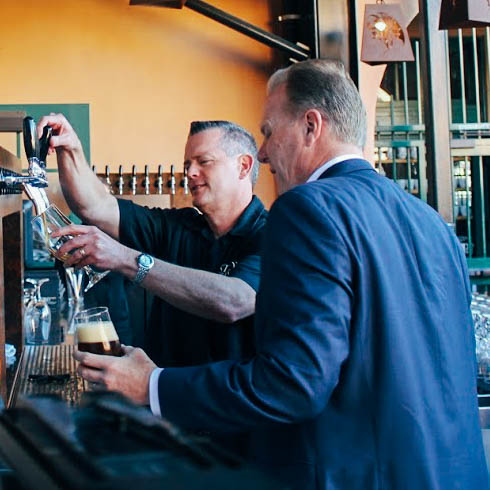Image: Shutterstock
Astronauts who live on the International Space Station drink their own urine, which is recycled into purified and potable water. If you live in San Diego or Singapore, you have probably sipped highly treated sewage water straight out of your tap—the California city has said it will use treated wastewater to provide one-third of its water supply by 2035.Even a few enterprising brewers are starting to experiment with it. San Diego-based Stone Brewing recently showed off its aptly named Full Circle Pale Ale (a one-time event, so it's not currently for sale), which is made of recycled water. "It has notes of caramel and tropical," spokesperson Colleen Gatlin told me. Mayor Kevin Faulconer declared it delicious. For many people, drinking sewage water—even if it's highly treated—sounds like a leap. But today is World Water Day, and the United Nations is urging everyone to view wastewater (treated, of course) as a precious resource. Already about 40 percent of the global population is affected by water scarcity, the UN says, and with climate change and other pressures, more people will find it difficult to access clean and reliable water in coming years. Treated sewage will have to become an important part of our supply, and that includes for drinking.San Diego, it's worth mentioning, also operates the largest desalination plant in the Western hemisphere to convert ocean water into drinking water. But that's very expensive to do, so in that city and in others, relying on treated wastewater will have to be the future.More than 80 percent of wastewater is currently discharged untreated into the environment, which can be dangerous to people and to surrounding ecosystems. Earlier this year, a study from the University of Waterloo found that, within just one single year, upgrading a wastewater treatment plant on Ontario's Grand River resulted in a 70 percent drop in fish with both male and female sexual organs, caused by birth control pills and other hormone-mimicking chemicals. (San Diego says its water treatment plan will cut the city's ocean wastewater discharges in half.)For people in developing countries, it's even more crucial. Dirty drinking water can spread deadly disease. About 1.8 billion rely on a source of water that's contaminated, according to the UN, and 2.8 billion don't have access to basic sanitation, including toilets.In many parts of the developed world—including much of Canada, which has 7 percent of the world's freshwater supply—access to clean water is taken for granted. Even here, people are willing to consider wastewater recycling under certain conditions, a 2013 study found.Read More: Abolish Bottled WaterTreated wastewater is already being used in lots of places for irrigation, but its use for drinking water is still only "marginal," according to the UN. As the technology improves—and as the public accepts the idea that the water they flush down the toilet may emerge, treated, from the tap later on—this could help us deal with water-strapped conditions we're bound to face.Drinking "toilet-to-tap" beer, as Grub Street memorably called it, could be one way to get us over the mental hurdle of consuming treated sewage. Water is a finite resource. If wastewater is good enough for the astronauts, it should be good enough for the rest of us, too.Subscribe to pluspluspodcast, Motherboard's new show about the people and machines that are building our future.
For many people, drinking sewage water—even if it's highly treated—sounds like a leap. But today is World Water Day, and the United Nations is urging everyone to view wastewater (treated, of course) as a precious resource. Already about 40 percent of the global population is affected by water scarcity, the UN says, and with climate change and other pressures, more people will find it difficult to access clean and reliable water in coming years. Treated sewage will have to become an important part of our supply, and that includes for drinking.San Diego, it's worth mentioning, also operates the largest desalination plant in the Western hemisphere to convert ocean water into drinking water. But that's very expensive to do, so in that city and in others, relying on treated wastewater will have to be the future.More than 80 percent of wastewater is currently discharged untreated into the environment, which can be dangerous to people and to surrounding ecosystems. Earlier this year, a study from the University of Waterloo found that, within just one single year, upgrading a wastewater treatment plant on Ontario's Grand River resulted in a 70 percent drop in fish with both male and female sexual organs, caused by birth control pills and other hormone-mimicking chemicals. (San Diego says its water treatment plan will cut the city's ocean wastewater discharges in half.)For people in developing countries, it's even more crucial. Dirty drinking water can spread deadly disease. About 1.8 billion rely on a source of water that's contaminated, according to the UN, and 2.8 billion don't have access to basic sanitation, including toilets.In many parts of the developed world—including much of Canada, which has 7 percent of the world's freshwater supply—access to clean water is taken for granted. Even here, people are willing to consider wastewater recycling under certain conditions, a 2013 study found.Read More: Abolish Bottled WaterTreated wastewater is already being used in lots of places for irrigation, but its use for drinking water is still only "marginal," according to the UN. As the technology improves—and as the public accepts the idea that the water they flush down the toilet may emerge, treated, from the tap later on—this could help us deal with water-strapped conditions we're bound to face.Drinking "toilet-to-tap" beer, as Grub Street memorably called it, could be one way to get us over the mental hurdle of consuming treated sewage. Water is a finite resource. If wastewater is good enough for the astronauts, it should be good enough for the rest of us, too.Subscribe to pluspluspodcast, Motherboard's new show about the people and machines that are building our future.
Advertisement

Advertisement
